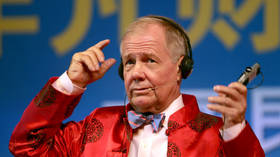‘Gender stereotypes’ & ‘sexual objectification’ banned from Stockholm billboards

Scantily-clad blondes on the streets of Stockholm will soon be a thing of the past after the city council voted to give the advertising regulator sweeping new powers to remove adverts it deems sexist or degrading.
The law, which will be enforced from next month, was passed Monday after receiving near-unanimous backing from all parties other than the populist Swedish Democrats. Stockholm now joins London and Paris as cities that have made similar moves in recent times.
READ MORE: ‘What, no handshake?’ Swedish company sued over job interview turned sour
Green Party Deputy Mayor Daniel Hellden, the architect of the plan, had previously argued that sexist advertising was representative of a society as a whole. Speaking to The Local, Hellden argued that the plan to further regulate adverts in the city is necessary to combat prejudice in Swedish society. "We are taking an important step to ensure that sexist or racist messages and attitudes are not visible on the surfaces that the city of Stockholm owns," he said.
‘Fight against discrimination’: Paris bans sexist, homophobic ads on billboards https://t.co/MT4WiUVvbO
— RT (@RT_com) March 29, 2017
As a self-regulating watchdog, the advertising regulator previously had the power only to make judgements on whether certain ads are sexist. Now, under the new rules, the adverts can be removed from any one of 700 billboards in the Swedish capital’s public spaces if they depict either men or women as “mere sex objects” or reinforce “stereotypical gender roles.”
“It affects a lot of people, especially younger women. It makes them think about their own bodies and how they look and feel in a negative way,” Hellden told advertising news website The Drum.
“Maybe the companies won’t put up ads which are sexist or objectifying if they know we’re going to remove them after 24 hours. So if it’s working well, we won’t have to use this legislation.”
READ MORE: Feminism or Islam? Sadiq Khan’s ban on ‘body shaming’ ads gets mixed reaction
Reklamera, a Swedish women’s group lobbying against gender discrimination in advertising, has backed the move, as has the Association of Swedish Advertisers. “It is becoming more of a symbolic issue from Stockholm City. It shows that we are taking the matter seriously,” a spokesman for the advertising group told Dagens Media.
London and Paris previously led the way on instituting bans on sexist advertising. In 2016, London Mayor Sadiq Khan moved to ban ads promoting an “unrealistic” body image from London’s Tube and bus network. This followed a backlash against a controversial 2015 ad depicting a overly-thin woman in a yellow bikini along with a catchline that read: “Are you beach body ready?” The ad received more than 400 complaints from commuters.
Think your friends would be interested? Share this story!














